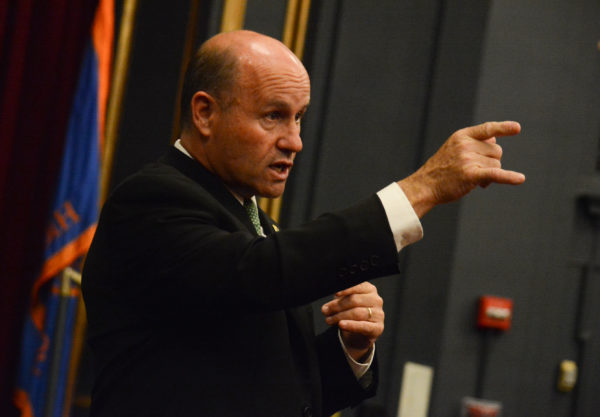Nassau County Police Commissioner Patrick Ryder said the state legislation that legalizes the adult use of marijuana in New York will complicate county police operations.
In late March, New York lawmakers approved a bill that allows New Yorkers to possess and smoke marijuana if they are over the age of 21, but the establishment of an Office of Cannabis Management and a comprehensive regulatory framework means that sales are expected to begin some time in 2022.
The state claims that tax collections from the adult-use cannabis program are projected to reach $350 million annually and that the new industry could create 30,000 to 60,000 jobs across the state.
Ryder, speaking to members of the Lakeville Estates Civic Association and general public during a Wednesday night Zoom call, said that the Police Department has always been challenged in its handling of impaired driving as a result of a person’s drug intake. Ryder said the resources the police department uses for dealing with drunk drivers differ from cases of impaired driving due to drugs.
“How we’ve done it with drugs has always been a challenge for us, because there is no Breathalyzer,” Ryder said. “So we would have to use what’s called the drug recognition expert. We only have six of them in the entire county. It takes months to train somebody to become a drug recognition expert.”
Ryder said that the legislation only makes instances like that more difficult to deal with, from a law enforcement perspective. Just the scent of marijuana or seeing a legal amount in a driver’s car does not mean that the driver is impaired. Another aspect that requires modification is the use of law enforcement canines.
“Our dogs, which we trained on the scent of marijuana, would give us the permissible use under the Supreme Court to search a vehicle for drugs,” Ryder said. “That no longer counts because marijuana is legal. So all of our dogs, we gotta retrain them and that’s going to cost us thousands of dollars.”
“As you can tell I’m not a fan,” Ryder said regarding the marijuana legislation. “Not a fan at all.”
Under the legislation, cities, towns and villages may opt out of allowing adult-use cannabis retail dispensaries or on-site consumption licenses by passing a local law by Dec. 31, or nine months after the effective date of the legislation, but will not be able to opt out of adult-use legalization.
In 2019, Nassau County legislators voted unanimously to opt out of the sale or use of recreational marijuana if the state legalizes it, but that legislation does not mention dispensaries or licenses either.
A vote in the Nassau Legislature to ban smoking marijuana on county-owned properties was scheduled for April 26, but no notifications of a vote were provided. Efforts to reach a legislative representative for comment on the tentative vote were unavailing. Nassau County Executive Laura Curran said she was in favor of the proposed law earlier in April.
“As a parent, I know we must do everything we can to keep cannabis out of kids’ hands and out of public spaces where minors may be present – including all County parks and facilities,” Curran said in a statement last month. “I look forward to signing this legislation as my number one priority is keeping our children safe. We must ensure the County’s public spaces are suitable and safe for all residents.”
The Board of Trustees of the Village of Flower Hill announced on Monday that it will hold hearings in June, July and August about opting out of recreational marijuana dispensaries.
Flower Hill Deputy Mayor Randall Rosenbaum noted that the Town of North Hempstead has not opted out of recreational marijuana sales yet, which would affect the possible income the village could see as a result of taxes on the product.
“If we did not opt out, we would get 3 percent of gross revenue right off the top, which is pretty significant business,” Rosenbaum said. “However, if North Hempstead didn’t opt out, if they allowed the sales in the town, we have to split the tax with them. So any windfall we thought we would get by allowing sales, we only get half, so then it’s not a windfall anymore.”



